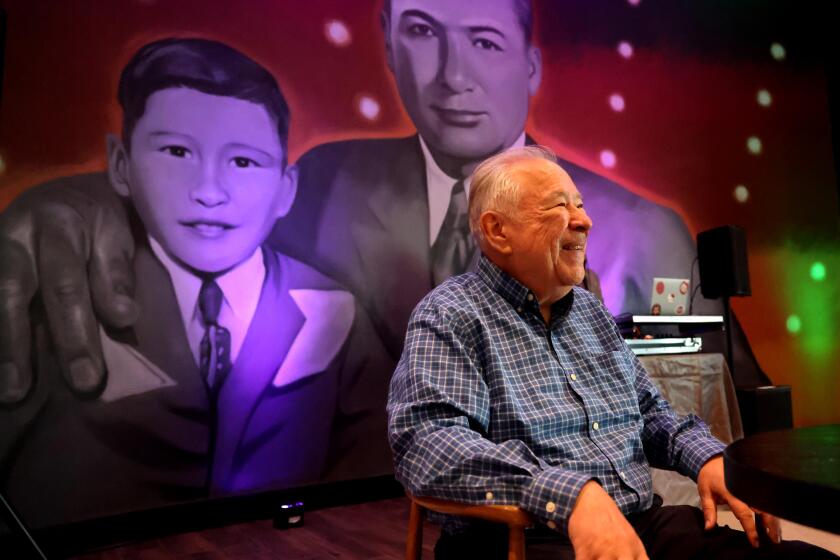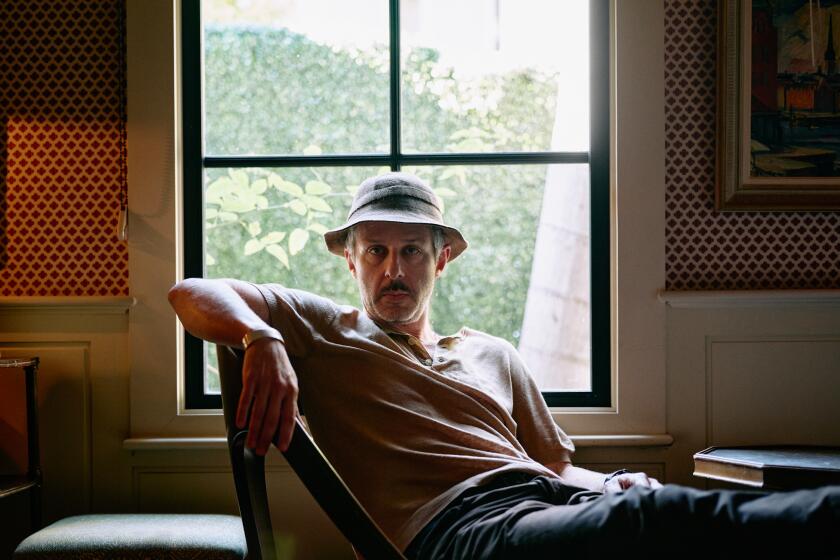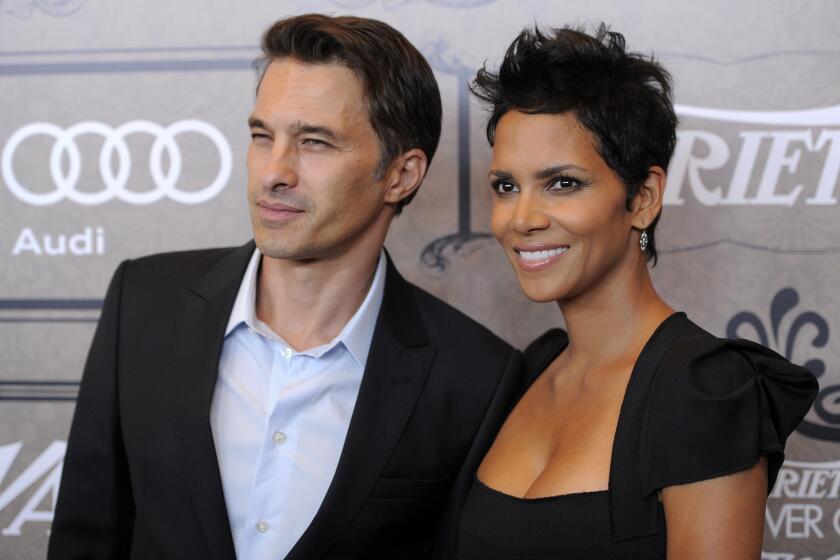Review: French drama ‘Les Cowboys’ artfully reworks ‘The Searchers’
“Les Cowboys,” Thomas Bidegain’s restless and emotionally bruising directorial debut, opens amid a flurry of red bandanas and blue denim, worn by men and women who have gathered to wave Stars and Stripes, and to sing and dance to their favorite folk tunes. The sights and sounds of classic Americana are so richly immersive that it’s not until after a man opens his mouth, launching into a lovely, lightly French-accented rendition of “Tennessee Waltz,” that you begin to grasp where these events are (or aren’t) taking place.
It’s the fall of 1994 in eastern France, at a festival where country-western enthusiasts have gathered to celebrate their shared passion. The giddy feeling of dislocation that this realization produces in the viewer — one aptly summed up by the movie’s eccentrically bilingual title — will soon be eclipsed by an altogether darker sense of cross-cultural confusion. Alain Balland (François Damiens), a devoted family man and prominent local figure, shares a dance with his 16-year-old daughter, Kelly (Iliana Zabeth), not realizing from the sad, resigned look on her face that this dance will be their last.
For the record:
12:45 p.m. June 24, 2016An earlier version of this review stated that “Les Cowboys” was unrated. It is rated R, for a brief violent image and a scene of drug use.
Within hours Kelly has vanished without a trace: In a series of letters to her family, she writes that she has taken on a new life with her boyfriend Ahmed, a Muslim, and tells them not to look for her. But when the police do nothing, Alain, whose self-styled cowboy identity turns out to run deeper than a mere taste for black hats and boots, vows to bring his daughter home. And so, with a righteous fury that frequently spills over onto his wife (Agathe Dronne) and their teenage son, he spends his days, months and years traversing Europe and the Middle East, tracking elusive leads and distant rumors, negotiating with shadowy figures, and casting a dim, fragmentary light on a little-known pocket of continental Arab life in the years leading up to 9/11.
The dramatic similarities between “Les Cowboys” and “The Searchers,” John Ford’s endlessly influential 1956 masterpiece, are no more accidental than Bidegain’s self-conscious yet utterly intuitive embrace of the American western tradition. This is not the first time that this French screenwriter, best known for his prize-winning collaborations with his countryman Jacques Audiard (“A Prophet,” “Rust and Bone,” “Dheepan”), has filtered the sociopolitical anxieties of modern Europe through the pulpy prism of genre. With “Les Cowboys,” he has taken the central narrative thrust of “The Searchers” — a man’s relentless, near-maniacal pursuit of a lost girl, driven in part by the queasy racial prejudice and sexual paranoia of the era — and recast it against a new pre- and post-millennial frontier of global anxiety.
There are, of course, some key differences. Kelly, or Aafia, as she now calls herself, is no stolen, violated innocent but rather a defiant master of her own destiny. And Damiens, despite the fierce and frightening commitment of his performance, is not exactly John Wayne, in part because the lone-wolf role has been smartly divided here between Alain and his son. Played as an adolescent by Maxim Driesen, and as a young man by Finnegan Oldfield, the boy is never identified on-screen (in the credits he’s billed simply as “the Kid”), but it is he who emerges as the film’s truer, more ambivalent protagonist as he searches far and wide for his sister.
As the years pass and the Twin Towers crumble, the Kid scans the headlines and follows rumors of Al Qaeda activity, wondering if they might hold the key to his sister’s whereabouts. His quest takes him as far as Pakistan, where he joins forces with a mysterious American mercenary (John C. Reilly) who has a possible lead on Ahmed. There are tense encounters, harrowing escapes and startling surprises along the way, but rather than seeming like lapses in plausibility, these thriller-like jolts serve to push “Les Cowboys” ever further into a genre experiment of its own making.
In this curious space between reality and myth, a dusty stretch of terrain becomes a sort of Monument Valley of the Middle East (handsomely shot by the cinematographer Arnaud Potier), and a cramped convenience store takes on an almost iconic power in the film’s most heart-stopping scene. Bidegain directs in a more contained and classical style than Audiard, and for all his interest in topicality and pastiche, he also respects the simple, melodramatic appeal of his story, and the primal emotions lurking beneath this story of parents and children torn apart.
Although it’s mostly set long before the rise of Islamic State, a fact that at times gives it an almost nostalgic air, “Les Cowboys” unsurprisingly plays with heightened urgency at a moment when many parents’ worst nightmares have come to pass. But this is no simple, reassuring tale of abduction and rescue. Its strength lies in the way it continually collapses the distance between people and cultures, forcing its characters to reckon with what they perceive as strange and unfamiliar. The most heroic and quintessentially western thing about “Les Cowboys” is that this moral imperative comes off not as some vague, well-meaning gesture toward tolerance, but rather as the logical conclusion of its bracing and adventurous spirit.
----------
‘Les Cowboys’
MPAA rating: R, for a brief violent image and a scene of drug use
Running time: 1 hour, 54 minutes
Playing: In limited release
More to Read
Only good movies
Get the Indie Focus newsletter, Mark Olsen's weekly guide to the world of cinema.
You may occasionally receive promotional content from the Los Angeles Times.











